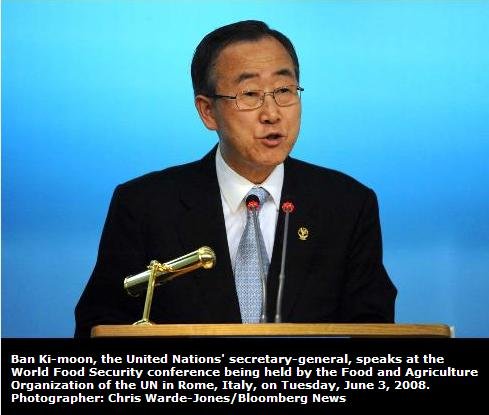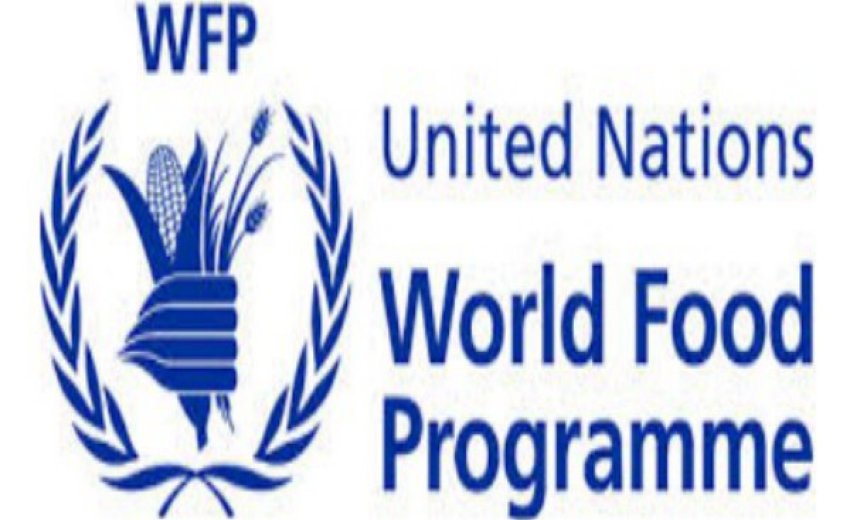 June 3 (Bloomberg) -- United Nations Secretary-General Ban Ki-moon called for a 50 percent increase in food production by 2030, saying that failure to feed the world's growing population will spark civil unrest and starvation.
June 3 (Bloomberg) -- United Nations Secretary-General Ban Ki-moon called for a 50 percent increase in food production by 2030, saying that failure to feed the world's growing population will spark civil unrest and starvation.
"The world needs to produce more food,'' he said today in the opening speech at the World Food Security conference in Rome. "While we must respond immediately to high food prices, it is important that our longer-term focus is on improving world security -- and remains so for some years.''
Leaders of developing nations, such as Brazilian President Luiz Inacio Lula da Silva, criticized the role subsidies that rich countries pay their farmers have played in stymieing food production, while Western leaders called for more aid to help increase output.
The three-day meeting is being held to cobble together solutions to ensure that the highest commodity prices in three decades don't further swell the ranks of the world's 860 million hungry people. Shortages of staples such as rice threaten to fuel civil unrest, said Ban, who also wants an end to farm subsidies, agricultural taxes and export bans.
A 60 percent increase in food prices since the beginning of 2007 has sparked riots in more than 30 countries -- including Cameroon and Egypt -- that depend on imported food. The wealthiest nations pledged $6.3 billion in emergency aid last year, yet critics say that will do little unless accompanied by policies that promote greater output.
Obvious Threats
"The threats are obvious to us all,'' said Ban, a 57-year- old South Korean.
The head of the UN Food and Agriculture Organization, Jacques Diouf, called for $30 billion of investment a year to boost agricultural production and fight hunger worldwide.
"How can we explain to people of good sense and good faith that it was not possible to find $30 billion a year to enable 862 million hungry people to enjoy the most fundamental of human rights: the right to food, and thus the right to life,'' he said.
Wealthy countries are being pressed to reverse two decades of declining farm aid to poor nations at the biggest meeting of world leaders to address surging food costs.
Last year, with food prices surging, development aid from donors such as the U.S., the European Union, Japan, Switzerland and Canada dropped 8.4 percent in real terms to $103.7 billion.
Food prices will stay ``well above their mean levels of the past decade'' in the next 10 years, the FAO forecast in a joint report last week with the Organization for Economic Cooperation and Development.
Ethanol
Brazil's Lula said food crops such as corn shouldn't be used to produce ethanol. African, Latin American and Caribbean countries could emulate his country's success at making ethanol from sugar cane in what he described as a "Golden Revolution.''
"Through cooperation, technology transfer and open markets, they can successfully produce sugar-cane ethanol or biodiesel too, and generate jobs, income and progress for their people,'' he said.
Ethanol from sugar cane gives off 8.3 times more energy than is needed to produce it, while for corn, the ratio is 1.5 times, Lula said.
The portion of the U.S. corn crop devoted to grain-derived ethanol will rise to 33 percent from 23 percent last year, according to the U.S. Department of Agriculture. Most of the crop is used for animal feed.
British Contribution
The U.K. will contribute 455 million pounds ($894 million), Secretary of State for International Development Douglas Alexander said in an interview today.
Developing countries are also being urged at the three-day meeting to make farming more productive and profitable.
Assistance for agricultural projects fell to 3 percent of total aid in 2006 from 17 percent in the early 1980s, a drop of two-thirds in real terms, according to the FAO.
That shift left the world's poorest nations more dependent on imports and particularly vulnerable to higher costs.
Global food prices soared 37 percent last year and another 16 percent in the first quarter of 2008, according to an FAO index, as bad weather hurt some harvests. Growing demand for grain-fed meat in Asia, market speculation, declining stocks and the push to grow corn for ethanol have contributed to the surge, said the United Nations Foundation, which funds and manages development projects.
Price Pressure
With pressure on prices likely to linger, the new aid may do little to lower food costs in the near term, though record harvests for cereal crops such as wheat and rice are forecast this year, experts say.
Record oil prices will keep fertilizer and shipping costs high, demand for biofuels like ethanol will grow in response to climate change and the system of subsidies that distorts prices and production will not easily be dismantled. The U.S. provided farmers with $13.4 billion in subsidies in 2006 and the EU paid out about 42 billion euros ($66 billion).
Iranian President Mahmoud Ahmadinejad blamed rich countries for the food crisis.
He called for the creation of an independent body to regulate the food market and to divert funds spent on the military to boosting food production and subsidies for the poor.
"Why do some powers turn the food of the people into an object of profiteering and attaining financial sources and keep hundreds of millions of people in poverty?'' he said.
- By Jennifer M. Freedman and Karl Maier
